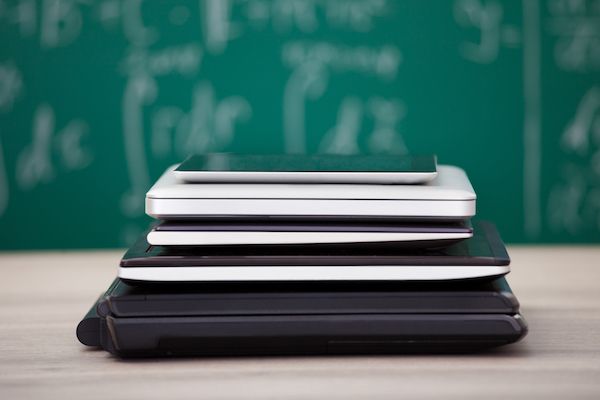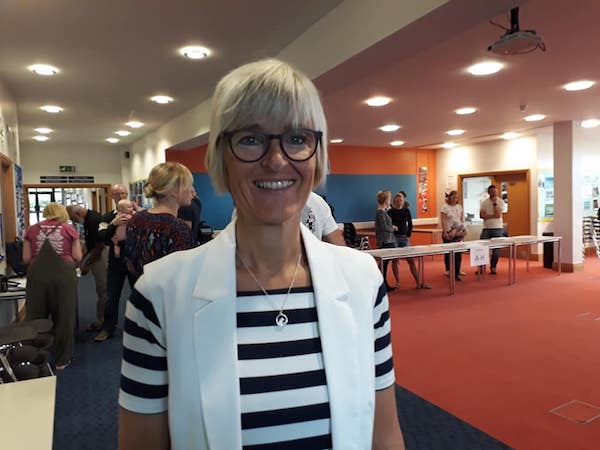

Guernsey's schools will soon have a 'digital roadmap' to follow which will guide the use of devices including mobile phones.
It's being created alongside plans for the future model of secondary education which will see one school run over two sites, with an executive headteacher overseeing both.
Liz Coffey's been given that job and has been working with the Committee for Education, Sport and Culture to develop plans for the new secondary school which will replace the current Grammar School, La Mare De Carteret, St Sampson's and Les Beaucamps High schools.
It's not likely to open for another few years as it's not even yet been confirmed where the two school sites will be, but details on that are expected to be released this month. Le Murier and Les Voies are expected to remain as they are under the new system.

Pictured: Liz Coffey, the Executive Headteacher of Guernsey's new secondary school model.
The schools are currently still being run as separate entities with the individual head teachers of each of the four States run mainstream secondary schools able to establish their own rules on certain things, including the use of mobile phones. Les Beaucamps High recently decided to ban the use of any mobile device during the school day - stating phones and tablets should be switched off and kept in pupils' bags until they leave school at the end of the day. Les Beaucamps is the first of the States run secondary schools to bring in such a ban - following in the footsteps of Blanchelande College which has had a similar rule in place for sometime, and Elizabeth College which experimented with an app limiting what a mobile phone could do during the school day.

Pictured: Deputy Matt Fallaize is President of ESC.
During last week's States meeting, Deputy Lester Queripel asked Deputy Matt Fallaize, the President of ESC, a number of questions about the policies for mobile phones within States schools.
Among the topics touched on were online bullying, educational uses and social media. Deputy Fallaize said at the moment there isn't one rule for all schools.
"The committee is minded to leave mobile phone use to the judgement of the school leaders, not least recognising the journey towards greater devolution to schools. Under the future secondary school structure, one school operating in two colleges, there will be a single policy on mobile phones and while developing this policy, the recently appointed Executive Headteacher will consult the committee and her colleagues in schools.
"This single policy will reflect the needs and balance the benefits and risks of mobile devices and the wellbeing of students will be at the forefront of any plans."
That single policy will be drawn up before the new school sites open, but for now, there is a requirement on each States run school to follow ESC's own Online Safety Policy.
ESC said that within this, schools are given "guidance on the appropriate use of mobile devices; there is also a requirement on schools that allow pupils to bring mobile devices to school to have a policy governing their safe and responsible use and to have a signed agreement with pupils and/or parents (depending on the age of the pupil) as to their appropriate use."
It's acknowledged that pupils will use mobile phones for different reasons, but the new single policy will cover all aspects of mobile phone use, including for socialising which is not currently covered by any ESC backed policy.
"There is a clear distinction between two different uses of mobile phones by pupils. The first is social use and the second is as a tool to support learning. Practice on social use varies between island schools as Education Services have not issued policy guidance on this. As new policies, such as a new Behaviour Policy, are developed for the one secondary school on two sites this will be addressed and there will be a more common approach to this issue. This will seek to provide a balance between keeping schools as safe and secure places for pupils and supporting pupils in learning to use mobile communication responsibly," said ESC.
Education Services which is overseeing the development of plans for a seamless transition towards the two school model, said it is also developing a digital roadmap to guide the educational use of ICT, including mobile devices, in the future.
"This will build on the many examples of excellent work within ICT taking place in its schools, supporting pupils’ learning and preparing them for employment.
"Education Services recognise the concerns many parents have over the use of mobile technology and are looking to balance these concerns with the educational benefits mobile devices bring and the need to educate pupils on their safe and responsible use."
Pictured top: The digital roadmap for the future use of digital technology in our schools is being developed by ESC.
Comments
Comments on this story express the views of the commentator only, not Bailiwick Publishing. We are unable to guarantee the accuracy of any of those comments.